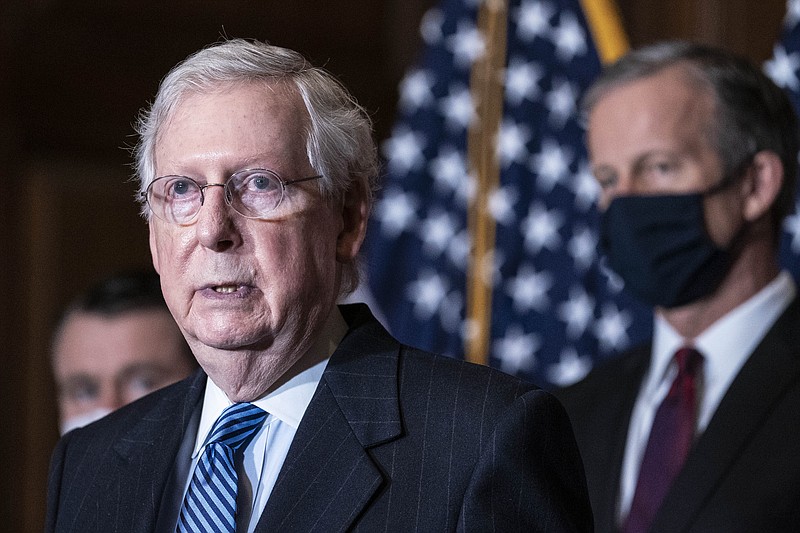WASHINGTON -- In a rare break with President Donald Trump, Senate Majority Leader Mitch McConnell is urging passage of a wide-ranging defense policy bill that Trump has threatened to veto.
McConnell, R-Ky., said Thursday that it was important for Congress to continue a nearly 60-year streak of passing the National Defense Authorization Act, which affirms 3% pay raises for U.S. troops and authorizes billions in military programs and construction.
"This [National Defense Authorization Act] will unlock more than $740 billion for the training, tools and cutting-edge equipment that our service members and civilian employees need to defend American lives and American interests," McConnell said in a Senate speech ahead of an expected vote Thursday or today. "It will give our troops the 3% pay raise they deserve. It'll keep our forces ready to deter China and stand strong in the Indo-Pacific."
The Democratic-controlled House overwhelmingly approved the defense bill Tuesday, defying Trump's veto threat and setting up a possible showdown with the Republican president in the waning days of his administration.
[Video not showing up above? Click here to watch » https://www.youtube.com/watch?v=lKXehWj1IcE]
A total of 140 Republicans joined 195 Democrats in backing the bill, which received support from more than 80% of the House -- well above the two-thirds support required to override a potential veto.
But Sen. Rand Paul, a Kentucky Republican, is objecting to a provision of the legislation that would raise hurdles for the president's ability to draw down troops in Afghanistan without the approval of Congress.
The provision added by GOP Rep. Liz Cheney and Democratic Rep. Jason Crow, an Afghanistan veteran, calls for the administration to submit inter-agency reports and certifications before reducing U.S. forces below the 8,000 level and again at 4,000.
Paul's opposition is slowing approval of the $740.5 billion National Defense Authorization Act.
The libertarian-leaning senator said he thought Democrats were backing the provision out of "partisan anger" because they didn't want Trump to have full discretion on taking troops out of Afghanistan. He argued that they were "going against their own alleged principles to get their desired results."
"It is partisan anger," Paul said. "People don't like President Trump. But this will bind all future presidents."
Trump has vowed to veto the bill unless lawmakers clamp down on social media companies he claims were biased against him during the election. Trump also wants Congress to strip out a provision of the bill that allows renaming of military bases that now honor Confederate leaders.
McConnell did not address Trump's veto threat, but said the bill "will secure President Trump's major progress at modernizing our capabilities, our technologies and our strategic nuclear deterrent."
The bill "does not contain every policy that either side would like to pass. But a huge number of crucial policies are included and a lot of bad ideas were kept out," McConnell said.
Trump tweeted Tuesday that he will veto "the very weak" defense bill unless it repeals Section 230, a part of the communications code that shields Twitter, Facebook and other tech giants from content liability.
The dispute over social media content interjects a complicated issue into a bill that Congress takes pride in having passed unfailingly for nearly 60 years. It comes after Trump's bid over the summer to block the package with a veto threat over the Confederate base names.
If he does veto the defense bill, Congress could cut short its Christmas recess to hold override votes, senior House members said.
"I think we can override the veto, if in fact he vetoes," House Majority Leader Steny Hoyer, D-Md., said Tuesday. "I hope he does not veto. I hope he reconsiders. And I think he will get substantial pressure, advice [from Republicans] that, you know, you don't want to put the defense bill at risk."
The defense measure guides Pentagon policy and cements decisions about troop levels, new weapons systems and military readiness, military personnel policy and other military goals.
Information for this article was contributed by Matthew Daly of The Associated Press; and by Daniel Flatley and Roxana Tiron of Bloomberg News.

